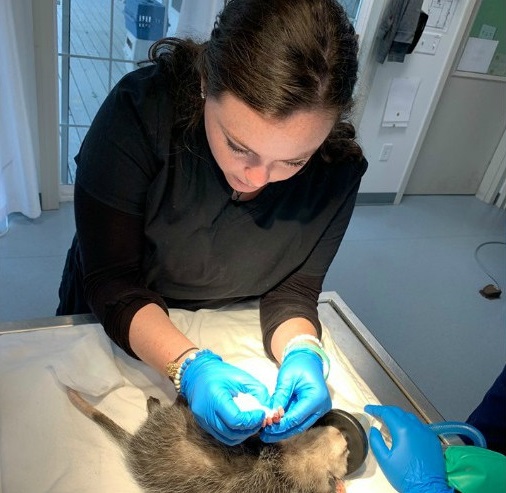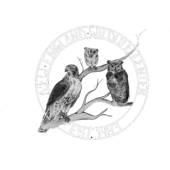
People and wildlife live side by side throughout Cape Cod. It is not unusual to find some species of wildlife that may be injured, sick or orphaned. Your course of action can make a huge difference in the outcome for the animal. Cape Wildlife Center is available to assist you with any help you might need. You can call our center seven days a week 9-4, 508 362-0111 to speak to a wildlife rehabilitator. After hours you can leave a message to be returned in the morning or you can look for licensed rehabilitators at Mass.Gov/wildlife rehabilitators. (Pictured is Cape Wildlife Center Vet Tech, Riley, helping to clean the foot of an opossum, who was hurt in a rat trap.)
What is an injured or sick animal:
Any animal with obvious wounds , bleeding, bruising or swelling, one or that has been in a cat or dog’s mouth.
Limping, or not moving, circling, or a bird with a wing droop
Discharge from eyes or nose
Weakness, or is not afraid when approached
What can you do:
If you can safely approach the animal, you may try to capture and contain it and call CWC. When capturing animals, use gloves for your safety if possible, confine it with a towel or cloth, securing the head , and place in a box with air holes, an animal crate or even a paper bag with holes. Do not give it any food or water. Keep it warm or and quiet in a dark place until you are able to get it to the proper facility.
What is an Orphaned animal:
An orphaned animal is one that has been separated from it’s parents. The first goal should always be to try to locate the parents and re-nest the animal if it is not injured. Many babies are unintentionally “kidnapped” by well meaning people. Birds and mammals can both be re-nested successfully. If you find an orphan, secure it with a soft cloth and keep it warm and quiet.
Re-nesting mammals:
Look for a nest or den in the area. If found, return to the nest and watch 6 hours or more for mother to return. You must be completely out of sight. If the mother returns, your work if done. If not contact CWC or a wildlife rehabilitator. If no nest is found, you can make one out of a basket or box and place near the site the orphan was found, and wait.
Re-nesting birds:
Check to see if bird is hurt. If it is , call CWC or wildlife rehabilitator. If you can find the nest, put it back in and wait for the parents. If no nest is found, make a substitute nest by using a basket or plastic container with holes poked in it . Line with dry grass. Put in babies, and hang it or attach it as high up in the tree as you can reach. Wait for the parents return (out of sight). If they do they will care for the young. If they don’t return, call CWC or a wildlife rehabilitator.
In dealing with wildlife, the best rule to follow is to be as non-disruptive as possible. Observe the animal to see how it is acting. Capture it as gently as possible and call for assistance when needed. Do not try to capture any rabies vector animals without trained assistance. These animals include raccoons, foxes, coyotes, bats, skunks, otters, woodchucks ,and fishers. Do not give the animal food or water. Quiet, warmth and calling for assistance will give the animal it’s best chance.

Recent Comments